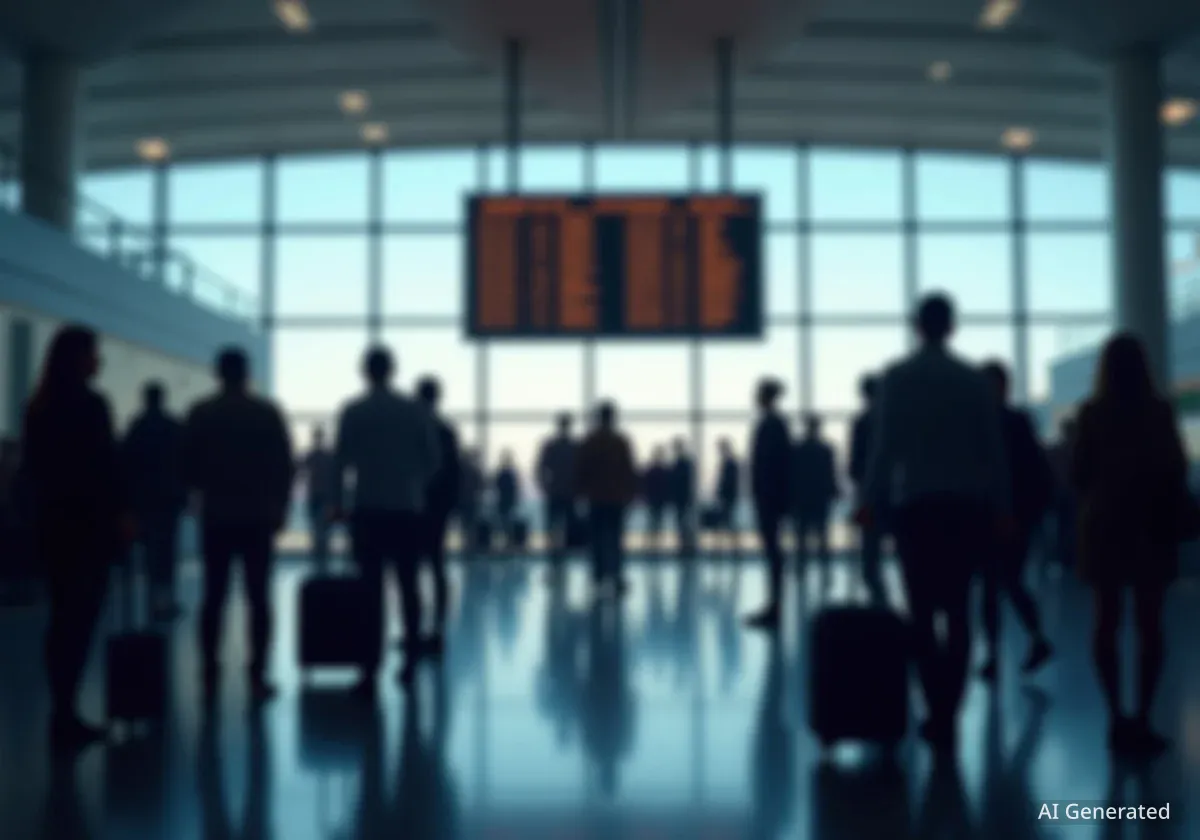Hundreds of flights at Dallas Love Field and Dallas-Fort Worth International Airport (DFW) experienced significant delays and cancellations on Friday. This widespread disruption was caused by a local telecommunications equipment problem, according to federal officials.
The Federal Aviation Administration (FAA) had to limit flights into and out of both major Dallas airports. This measure was taken to manage the situation and ensure safety while the telecommunications issue was addressed.
Key Takeaways
- Over 550 flights delayed at DFW Airport.
- Telecom equipment issue, not FAA equipment, caused problems.
- Travelers faced rebooking challenges and extended waits.
- FAA working with phone company to find the cause.
Widespread Flight Disruptions Across Dallas
The problems began on Friday, affecting a large number of air travelers. The FAA confirmed that the issue stemmed from local telephone company equipment. This equipment is crucial for air traffic control communications in the Dallas-Fort Worth area.
An official on air traffic control recordings described the impact, stating,
"The entire metroplex took a hit. Right now, we’ve lost all radar and phone communications."This statement highlights the severity of the communication breakdown.
Matt Yonchak, a traveler at Dallas Love Field, shared his experience. He stated,
"Honestly, I have the worst travel luck ever."Yonchak noted continuous half-hour delays for his Southwest flight. Such frequent delays created uncertainty and frustration for passengers.
Impact Statistics
- DFW Airport: More than 550 flights delayed, 510 cancellations reported.
- Dallas Love Field: 211 delays, 1 cancellation reported.
- The ground stop at Love Field was lifted around 7:30 p.m. on Friday.
- DFW Airport's ground stop was lifted around 9:30 p.m. on Friday.
Traveler Accounts and Rebooking Challenges
Many passengers found themselves stranded or facing difficult travel decisions. Mel Lam, whose fiancé works for WFAA, was stuck in Ohio after her flight to Dallas was cancelled. She tried to find alternative flights to nearby cities like Austin, San Antonio, and Tulsa, but found no available options.
Lam expressed her frustration with the technology involved.
"I feel like our technology should be better than what it is right now for this stuff not to happen,"she commented. This sentiment was shared by many travelers affected by the delays.
WFAA's Tiffany Liou reported from DFW International Airport. She observed many passengers attempting to rebook their flights. The widespread nature of the issue meant that recovery could take several days, impacting travel plans for the weekend and beyond.
Airline Responses and Passenger Options
American Airlines issued a statement regarding the situation. They confirmed that travelers affected by the disruptions could rebook their flights without incurring change fees. This policy aimed to help passengers manage the unexpected changes to their itineraries.
Southwest Airlines also acknowledged the issue. They stated that inbound flights to Dallas Love Field were either slowed or held at their departure airports. A few of their flights were diverted, and the airline worked to get them back on track once the FAA gave clearance.
Background on FAA and Infrastructure
The FAA clarified that the problems in Dallas were not connected to the aging equipment used by air traffic controllers or the nationwide shortage of controllers. These two issues had previously caused disruptions at Newark Liberty International Airport earlier in the year.
The federal government is currently working to upgrade air traffic control technology. Congress approved $12.5 billion for these improvements. Additionally, there are plans to hire thousands more air traffic controllers. However, these efforts are expected to take several years to complete.
Ongoing Efforts to Resolve and Prevent Issues
The FAA continues to work closely with the local telephone company. Their goal is to determine the exact cause of the equipment malfunction. Understanding the root cause is essential for implementing preventative measures in the future.
Travelers like Matt Yonchak expressed hope for a swift resolution.
"Right now, just hoping that the phone company gets its stuff together,"he said. The impact on hundreds of travelers underscores the critical role of reliable telecommunications infrastructure in modern air travel.
While regional airports initially experienced impacts, many were given the all-clear by late Friday afternoon. This suggests that the core of the problem was concentrated around the main Dallas hubs.
- Passenger safety remains the top priority for Dallas Love Field.
- The airport is maintaining constant communication with partners, including the FAA.
- Minimizing disruptions for travelers is a key focus during such incidents.
The incident highlights the vulnerability of complex systems to single points of failure. As air travel continues to grow, maintaining robust and resilient infrastructure becomes even more important.





